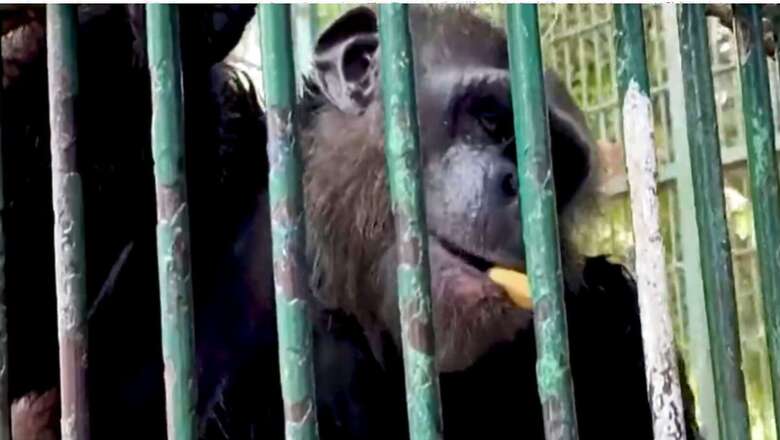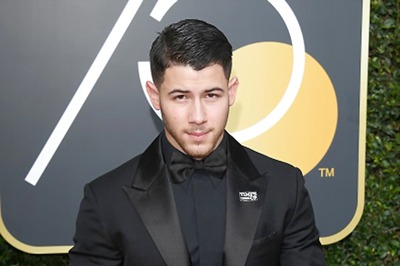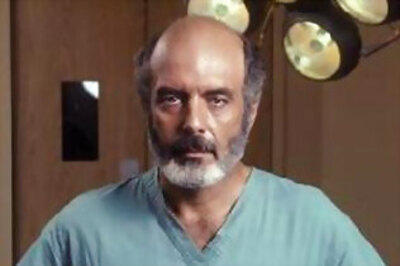
views
Wildlife conservation, like plentiful other topics that are discussed on a daily basis, has attracted a lot of attention for people recently. The true purpose of zoos and wildlife conservation centres has been quite a debatable topic — whether they are just fancy and exotic enclosures holding animals captive, or are they truly educational hubs that genuinely advocate to protect magnificent but endangered species from going extinct, off the face of earth? The intention, execution and consistent management of animals is what distinguishes the former from the latter, which has been intricately and avidly captured in Gerald Durrell’s novel, Gorilla in the Guestroom. It highlights how N’Pongo, a male baby gorilla, ironically prospers in a confined environment, much contrary to most caged species.
The gist of the story revolves around Gerald Durrell, who buys a baby gorilla and rears him in his own little zoo; not as a showpiece but as a means to preserve the gorilla species via inbreeding. Forming strong bonds with a human that acquires and dominates an animal as merely a commodity in his feigned wildlife conservation centre, is a taxing process and activity. Where most animals would view humans as loathsome and cruel, assuming full control and command of their lives, N’Pongo overcame that barrier of hatred and mistrust effortlessly and shared a relationship of mutual love and affection with Durrell.
Durrell would treat N’Pongo as his own child and take care of him wholeheartedly. The very fact that N’Pongo’s cage was described as ‘palatial quarters’ in the story goes to show that Durrell gave it due consideration that a baby gorilla would need a lot of space to run, jump and play around. In addition to that, albeit he was on a tight budget, he bought Nandy (a second female gorilla he bought) on installment terms so that N’Pongo would have a playmate to keep him from turning into a morose and melancholic anthropoid, in imitation to the lonely and miserable ones we see in other zoos.
Durrell mentions that it was an achievement to have acquired a pair of such rare animals, gorillas, that would soon be extinct. He harboured genuine concern for N’Pongo’s health when he fell sick, three weeks prior to Durrell’s working holiday in France. The bowels of the two gorillas were a daily topic of discussion among the staff members. In most zoos, even ones with ample resources, insufficient care is imparted to the animals, which worsens their already declining health. In comparison to such zoos, Durrell was constantly on the outlook for a remedy that would improve N’Pongo’s condition. He went down to the market in St Helier with his wife Jacquie and went out of his way to buy exotic fruits and vegetables such as hothouse grapes, watermelons and avocado pears, though it cost them a small fortune. Just as humans refuse to eat during their sickness, N’Pongo refused to eat too which worried Durrell and the staff to no end and which also goes on to show how behaviourally similar primates are to humans.
The only way N’Pongo could recover was if he would eat well and get nutrition to strengthen his immune system. The problem was that he would not eat anything which meant that they could not administer medicines to him either. They realised that they must do so by any means, fair or unfair, thus resorting to distracting him with pieces of watermelon to inject him with the medicines. Durrell’s commitment towards N’Pongo forged an irreplaceable bond between the two which kept N’Pongo from feeling emotionally suffocated. The constant care that was catered to N’Pongo and emotional warmth he was given, contributed to his speedy recovery, besides just the effect of the medicines.
The task of looking after animals after taking custody for them must be maintained throughout and cannot be abandoned like old toys after one is satisfied with the thrill of getting entertained by them. In many wildlife conservation centres and zoos, after a considerable amount of time, the animals succumb to their feelings of guilt and oppression which manifest in their physical health. They become lean, weak and are not looked after adequately, hardly surviving on insufficient amounts of food. N’Pongo, although in a caged and human-dominating territory, was never neglected and was given exposure to humans and loved by the staff, which provided him with an opportunity to escape the depression most animals slip into due to their captivity and alienation from their kind. N’Pongo, in contrast to most other animals, enjoyed the new world he was brought into and did not allow negativity to bother him or penetrate into his heart.
Animals living in the confines of zoos do not accurately represent the true nature of their wild counterparts as their nature and behaviour is greatly altered to suit coexistence with humans in a tiny ecosystem created artificially. Ordinarily, most animals captured from lusty, lush green forests, moved into uncomfortably small cages would become depressed, lethargic and weak in due course of time. In contrast to this, N’Pongo was jovial and exuberant in his behaviour, in distinction to a lion or a tiger that would hide itself in its cage. N’Pongo would openly and willingly interact with his visitors, lolling out on the grass, pose for the photographers, pull pranks on them and enjoy his time with the most gleeful shine in his eyes.
Another aspect to be taken into account over here, is that wild animals, as their name suggests, are meant to live in the wild habitat. Such species are built for hunting and preying upon other species or plants which take care of their nutritional as well as physical needs, lacking the luxury of technology, unlike humans. The health of animals in zoos and conservation centres deteriorates rapidly owing to upset diet, food cycles and inadequate exercise. Fortunately, such was not the case with N’Pongo, being provided with a variety of succulent and luscious assortment of fruits and vegetables, thereby keeping him healthy and balanced alongside a large cage with umpteen branches to swing about from.
In addition to these arrangements, he had a wife like Nandy to keep him company by her patient endurance towards his tricks. N’Pongo was of an extremely exuberant nature, content with what he was provided with, making the most meagre and basic resources seem as a luxury. N’Pongo was reported to have a ‘beautiful behaviour’, according to Durrell which stems from the suggestion that having prior experience with human interaction, N’Pongo was conditioned to behave in a docile manner that would be acceptable to humans rather than those of his own kind. N’Pongo was treated and cared for like a baby gorilla while appreciating his humanoid emotions such as his jocund and happy go lucky nature, which is quite an infrequent occurrence to behold. His nature is what made him stand out and caused him to be loved dearly by everyone, bearing in mind it is very hard to be happy from within while being in a state of captivity.
The lion’s share in zoos is utilised for entertainment purposes; however, even though N’Pongo was kept in the zoo for the purposes of showcasing and in-breeding of species, he understood, to a point, that Durrell and staff meant no ill will. This is seen prominently, when Durrell mentions that when it was necessary to put N’Pongo back into the cage, he would submit with good grace when he realised it was inevitable. He would protest in the manner of shouting a couple of faint peevish screams but otherwise would not throw much of a tantrum.
This leads us to the next feature under this section, that because N’Pongo was cognitively well stimulated, he rapidly picked up cues of how to adapt and adjust into the human world. This is seen in many instances throughout the novel, for example, before a cage was arranged for N’Pongo, he was accommodated into Durrell’s flat for a temporary period. Here, he learned to operate and somehow figure out the ‘magic’ in the opening and closing of door handles. Furthermore, dissimilar to the horrendous behaviour of majority animals, he would try a different approach to a problem or situation if he encountered one.
Ultimately, it goes to show that if animals are treated well and are looked after with care and affection, it positively affects their cognitive development and advances them to a higher level, so as to being able to cope up with the difference of living in a human habitat. The treatment and handling of animals is paramount in shaping their behaviour and decides what condition a wild species would live his life in. N’Pongo’s example has been instrumental in shedding light upon how an animal can prosper even in a habitat far different and away from their native jungles, with the right kind of support.
Cognitive functioning refers to multiple mental abilities, including learning, thinking, reasoning, remembering, problem solving, decision making, and attention. Also, cognitive functioning is predominantly the preserve of human beings, not animals. However, that said, the big takeaway from N’Pongo’s graceful behaviour, despite being in captivity, is that, sometimes, even gorillas are capable of cognitive functions like learning, reciprocating and remembering. Don’t forget, N’Pongo learned to reciprocate the love showered upon him, enjoyed the attention of his female companion Nandy, and made a conscious decision to make the most of his captivity, by having a positive attitude. The ability to adjust to new surroundings, if treated with love and care is therefore not the sole preserve of humans.
Yashee Jha, a multi-faceted student, is an avid commentator on various topical issues. The views expressed in this article are those of the author and do not represent the stand of this publication
Read all the Latest Opinion News and Breaking News here




















Comments
0 comment